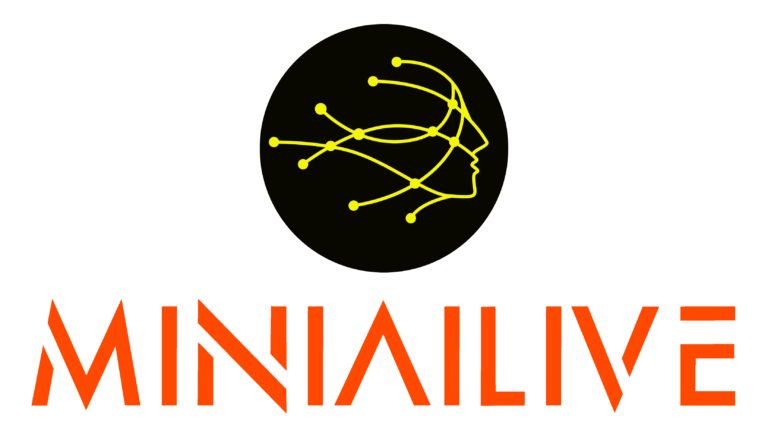
MiniAI-Face-LivenessDetection-AndroidSDK
Upgrade your Android app with MiniAiLive's 3D Passive Face Liveness Detection! With our advanced computer vision techniques, you can now enhance security and accuracy on your Android platform. Check out our latest repository containing a demonstration of 2D & 3D passive face liveness detection capabilities. Try it out today!
Stars: 148

The MiniAiLive Face Liveness Detection Android SDK provides advanced computer vision techniques to enhance security and accuracy on Android platforms. It offers 3D Passive Face Liveness Detection capabilities, ensuring that users are physically present and not using spoofing methods to access applications or services. The SDK is fully on-premise, with all processing happening on the hosting server, ensuring data privacy and security.
README:
Welcome to the MiniAiLive!
Upgrade your Android app with MiniAiLive's 3D Passive Face Liveness Detection! With our advanced computer vision techniques, you can now enhance security and accuracy on your Android platform. Check out our latest repository containing a demonstration of 2D & 3D passive face liveness detection (face anti-spoofing) capabilities. Try it out today!
Note
SDK is fully on-premise, processing all happens on hosting server and no data leaves server..

Feel free to Contact US to get a trial License.
Contributions are welcome! If you'd like to contribute to this project, please follow these steps:
1. Fork the repository.
2. Create a new branch for your feature or bug fix.
3. Make your changes and commit them with descriptive messages.
4. Push your changes to your forked repository.
5. Submit a pull request to the original repository.Please visit our Face API Web Demo here. https://demo.miniai.live
| No | Project | Feature |
|---|---|---|
| 1 | MiniAI-Face-Recognition-LivenessDetection-AndroidSDK | Face Matching, 3D Face Passive Liveness |
| 2 | MiniAI-Face-Recognition-LivenessDetection-iOS-SDK | Face Matching, 3D Face Passive Liveness |
| 3 | MiniAI-Face-Recognition-LivenessDetection-ServerSDK | Face Matching, 3D Face Passive Liveness |
| 4 | MiniAI-Face-Recognition-LivenessDetection-WindowsSDK | Face Matching, 3D Face Passive Liveness |
| 5 | MiniAI-Face-LivenessDetection-AndroidSDK | 3D Face Passive Liveness |
| 6 | MiniAI-Face-LivenessDetection-iOS-SDK | 3D Face Passive Liveness |
| 7 | MiniAI-Face-LivenessDetection-ServerSDK | 3D Face Passive Liveness |
| 8 | MiniAI-Face-Matching-AndroidSDK | 1:1 Face Matching |
| 9 | MiniAI-Face-Matching-iOS-SDK | 1:1 Face Matching |
| 10 | MiniAI-Face-Attributes-AndroidSDK | Face Attributes |
MiniAiLive is a leading AI solutions company specializing in computer vision and machine learning technologies. We provide cutting-edge solutions for various industries, leveraging the power of AI to drive innovation and efficiency.
For any inquiries or questions, please Contact US
For Tasks:
Click tags to check more tools for each tasksFor Jobs:
Alternative AI tools for MiniAI-Face-LivenessDetection-AndroidSDK
Similar Open Source Tools

MiniAI-Face-LivenessDetection-AndroidSDK
The MiniAiLive Face Liveness Detection Android SDK provides advanced computer vision techniques to enhance security and accuracy on Android platforms. It offers 3D Passive Face Liveness Detection capabilities, ensuring that users are physically present and not using spoofing methods to access applications or services. The SDK is fully on-premise, with all processing happening on the hosting server, ensuring data privacy and security.
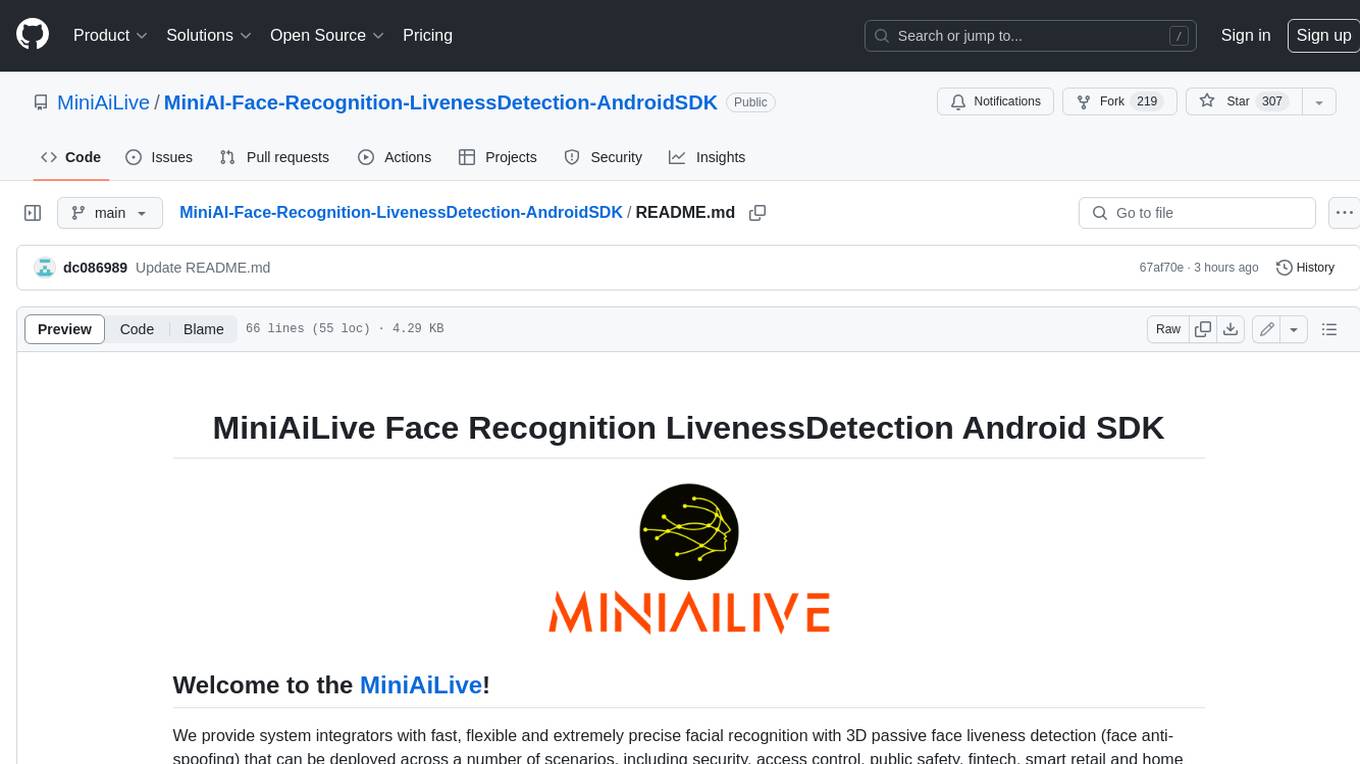
MiniAI-Face-Recognition-LivenessDetection-AndroidSDK
MiniAiLive provides system integrators with fast, flexible and extremely precise facial recognition with 3D passive face liveness detection (face anti-spoofing) that can be deployed across a number of scenarios, including security, access control, public safety, fintech, smart retail and home protection.
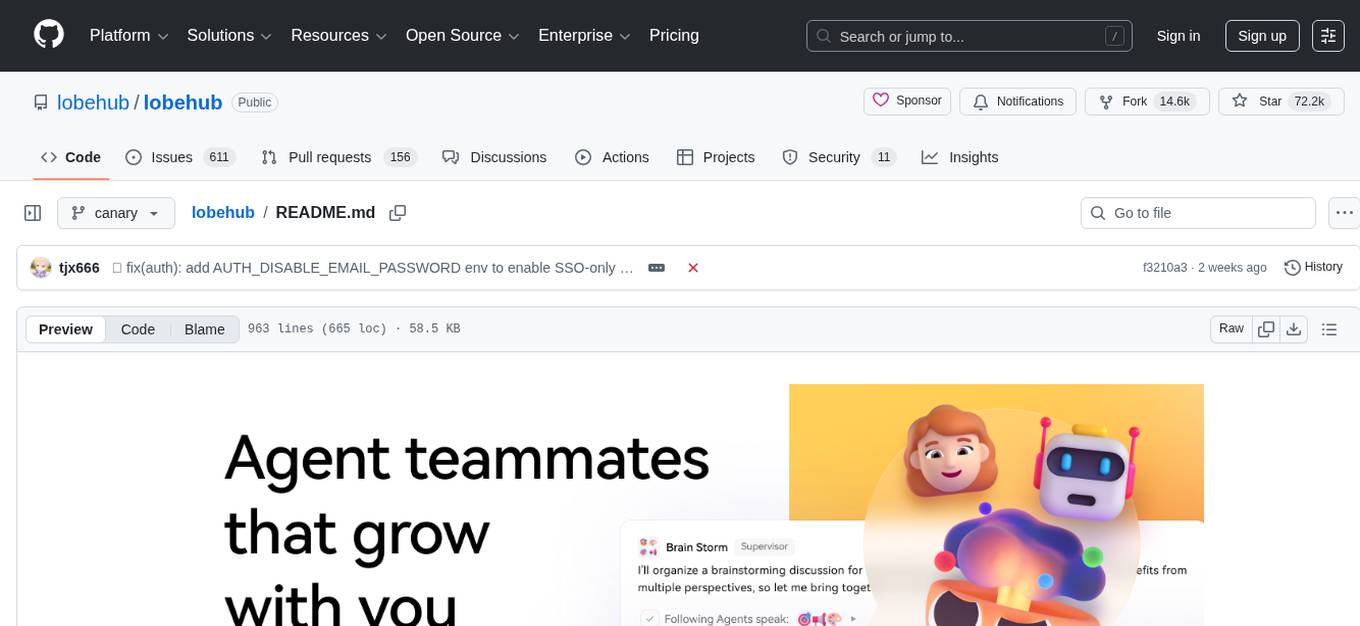
lobehub
LobeHub is the ultimate space for work and life, where users can find, build, and collaborate with agent teammates that grow with them. It aims to create the world's largest human-agent co-evolving network. LobeHub treats agents as the unit of work, providing an infrastructure for humans and agents to co-evolve. Users can create personalized AI teams, collaborate with agent groups, and experience the co-evolution of humans and agents. The platform supports various features like model visual recognition, TTS & STT voice conversation, text to image generation, plugin system for function calling, and an agent market for GPTs. LobeHub also offers self-hosting options with Vercel, Alibaba Cloud, and Docker Image, along with an ecosystem of UI components, icons, TTS libraries, and lint configurations.
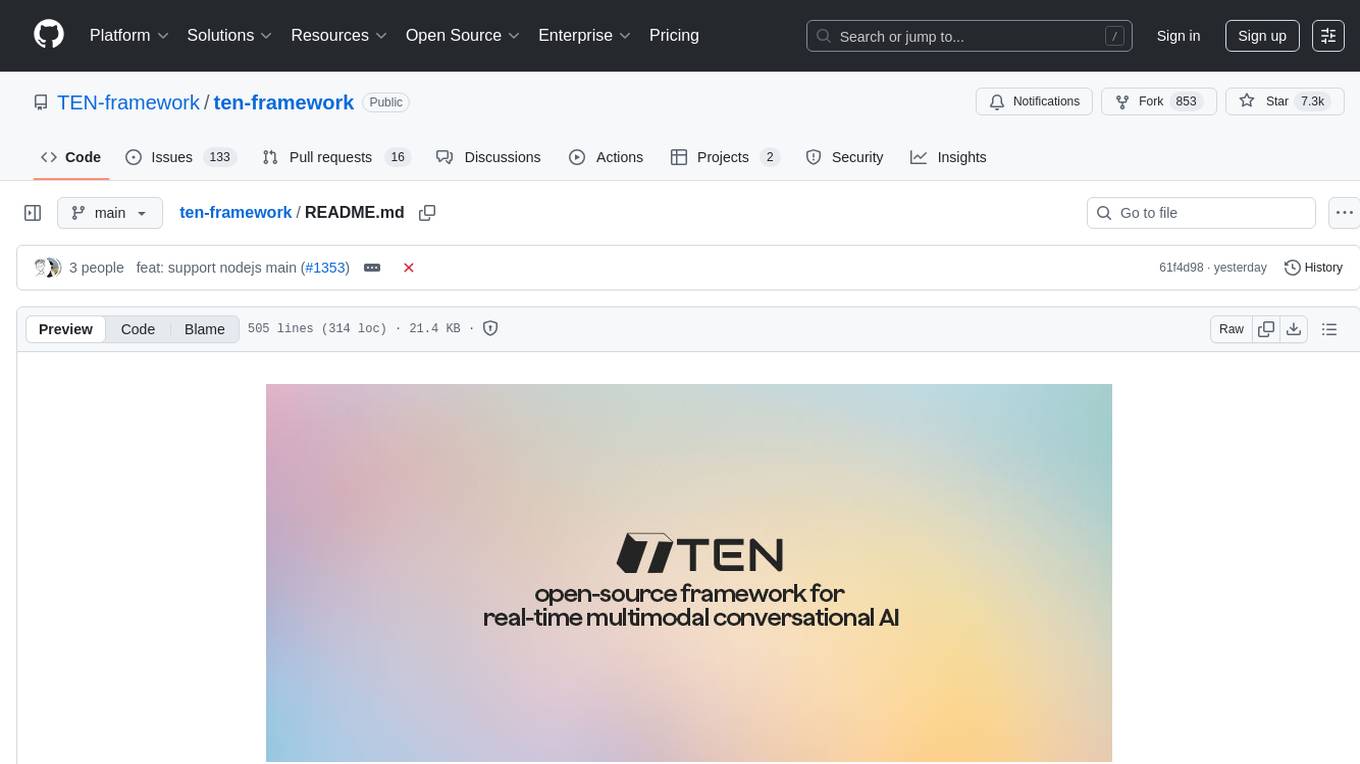
ten-framework
TEN is an open-source ecosystem for creating, customizing, and deploying real-time conversational AI agents with multimodal capabilities including voice, vision, and avatar interactions. It includes various components like TEN Framework, TEN Turn Detection, TEN VAD, TEN Agent, TMAN Designer, and TEN Portal. Users can follow the provided guidelines to set up and customize their agents using TMAN Designer, run them locally or in Codespace, and deploy them with Docker or other cloud services. The ecosystem also offers community channels for developers to connect, contribute, and get support.
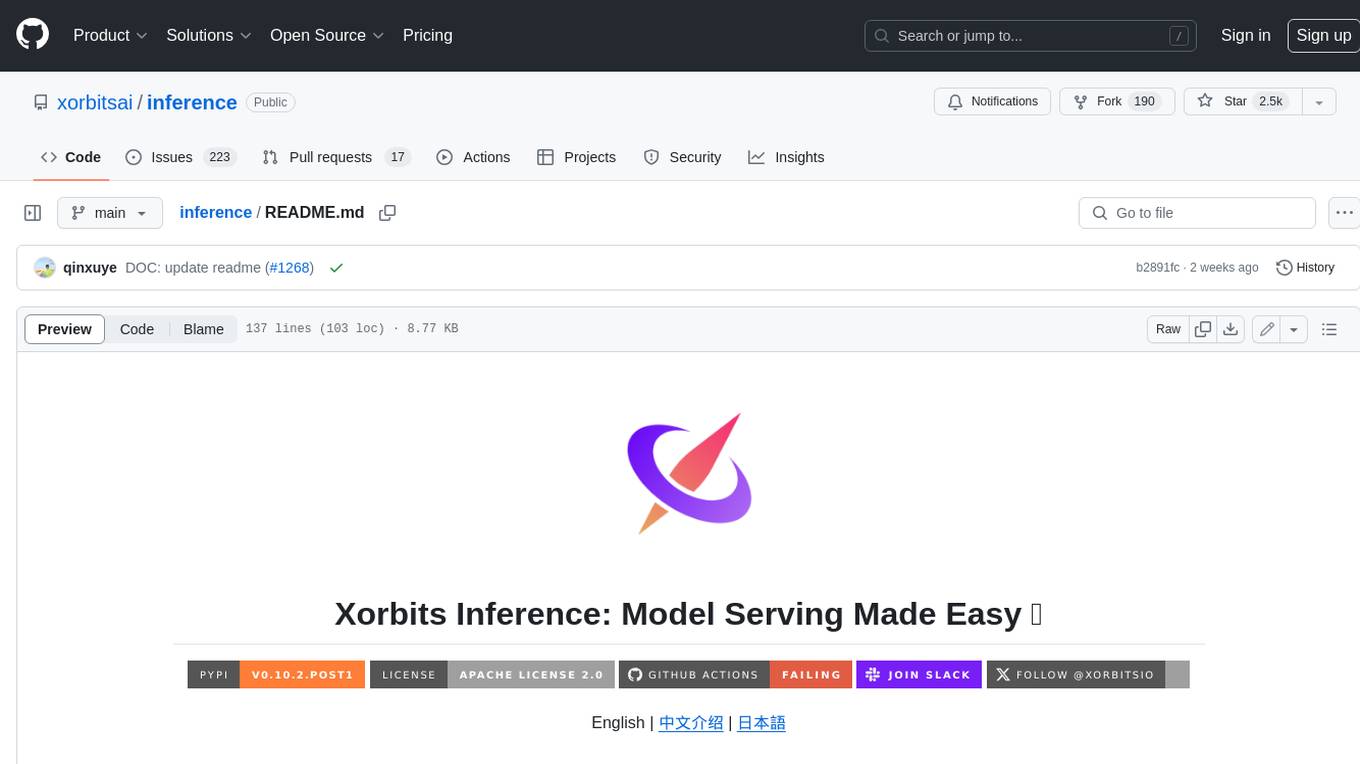
inference
Xorbits Inference (Xinference) is a powerful and versatile library designed to serve language, speech recognition, and multimodal models. With Xorbits Inference, you can effortlessly deploy and serve your or state-of-the-art built-in models using just a single command. Whether you are a researcher, developer, or data scientist, Xorbits Inference empowers you to unleash the full potential of cutting-edge AI models.
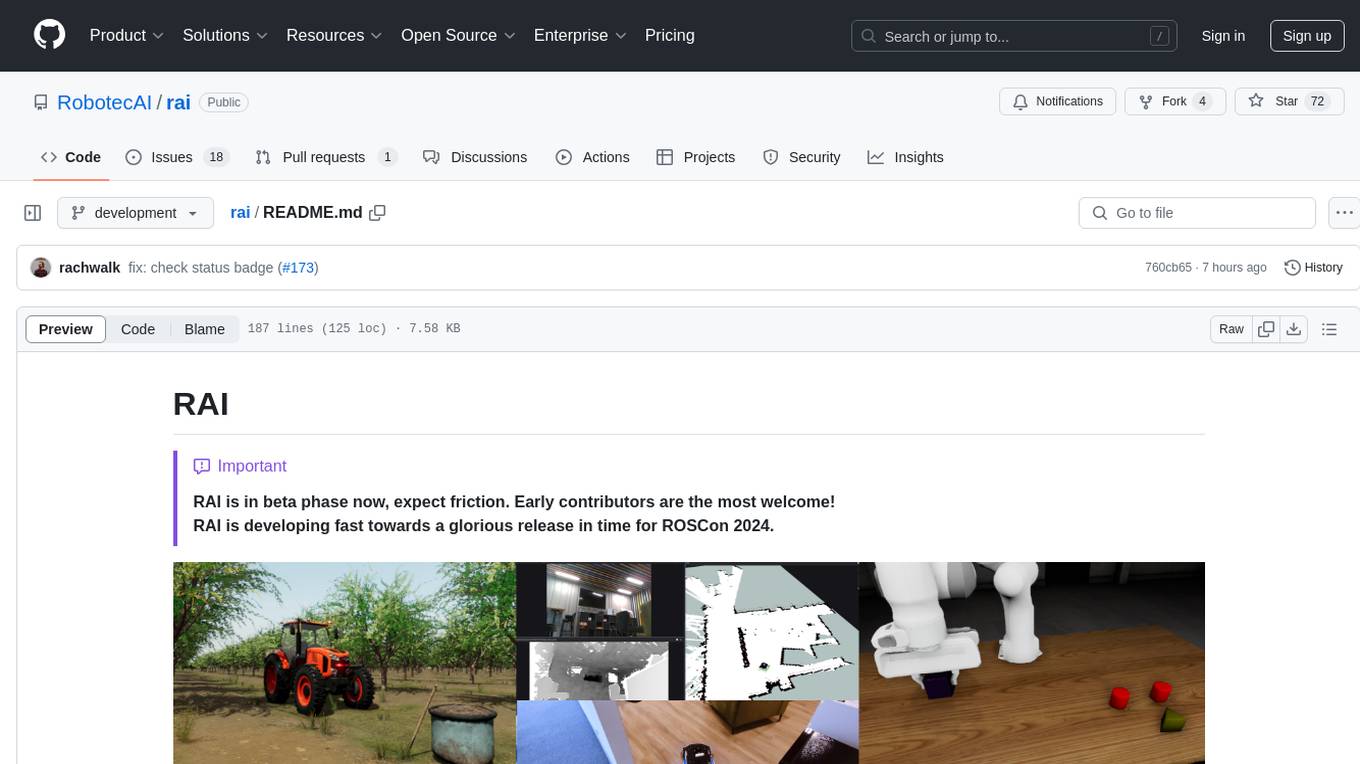
rai
RAI is a framework designed to bring general multi-agent system capabilities to robots, enhancing human interactivity, flexibility in problem-solving, and out-of-the-box AI features. It supports multi-modalities, incorporates an advanced database for agent memory, provides ROS 2-oriented tooling, and offers a comprehensive task/mission orchestrator. The framework includes features such as voice interaction, customizable robot identity, camera sensor access, reasoning through ROS logs, and integration with LangChain for AI tools. RAI aims to support various AI vendors, improve human-robot interaction, provide an SDK for developers, and offer a user interface for configuration.
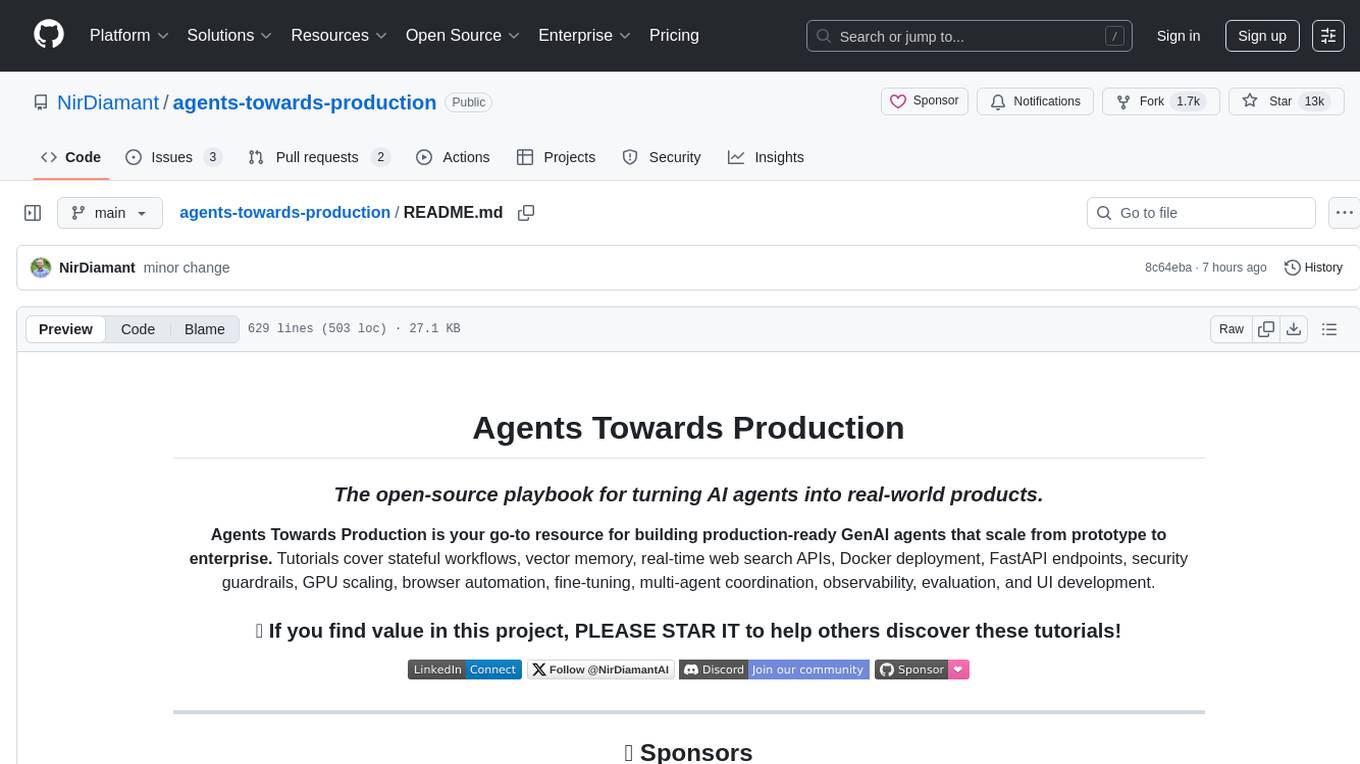
agents-towards-production
Agents Towards Production is an open-source playbook for building production-ready GenAI agents that scale from prototype to enterprise. Tutorials cover stateful workflows, vector memory, real-time web search APIs, Docker deployment, FastAPI endpoints, security guardrails, GPU scaling, browser automation, fine-tuning, multi-agent coordination, observability, evaluation, and UI development.
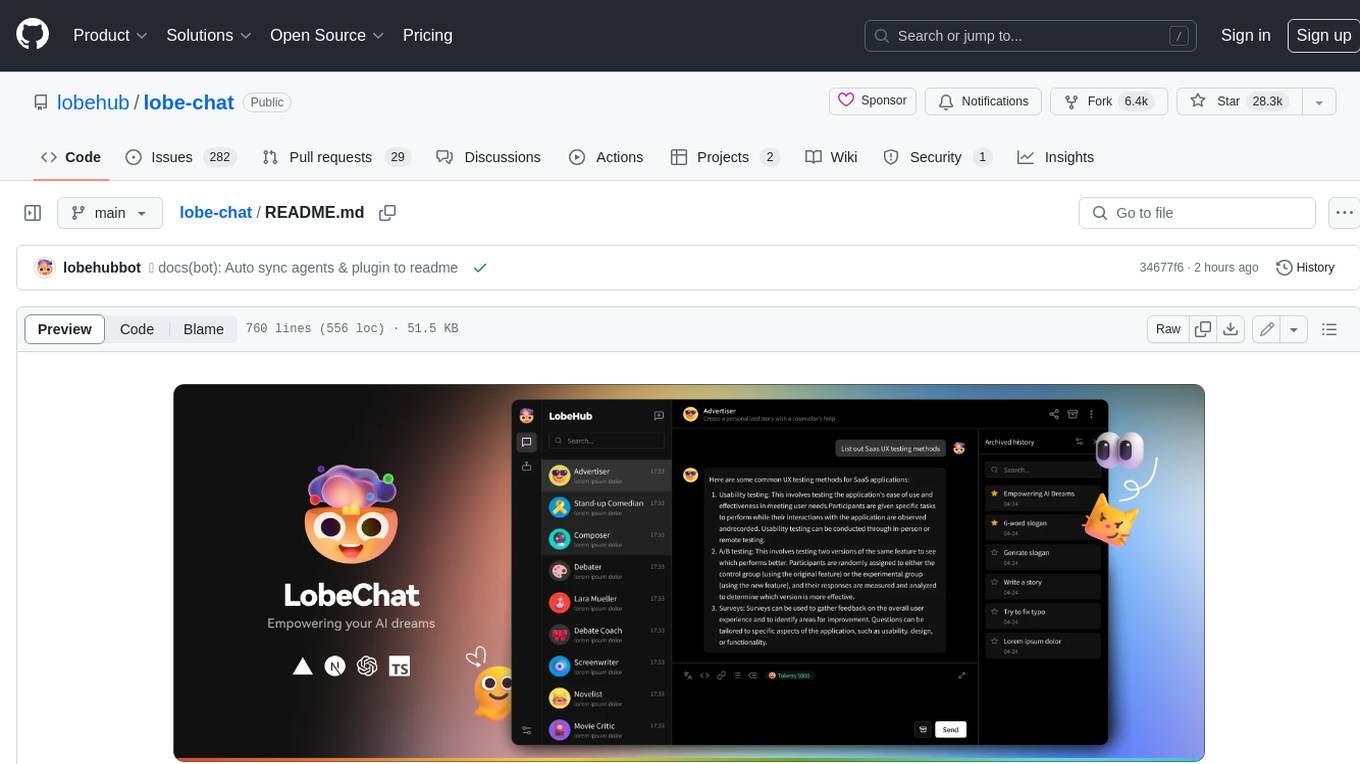
lobe-chat
Lobe Chat is an open-source, modern-design ChatGPT/LLMs UI/Framework. Supports speech-synthesis, multi-modal, and extensible ([function call][docs-functionc-call]) plugin system. One-click **FREE** deployment of your private OpenAI ChatGPT/Claude/Gemini/Groq/Ollama chat application.
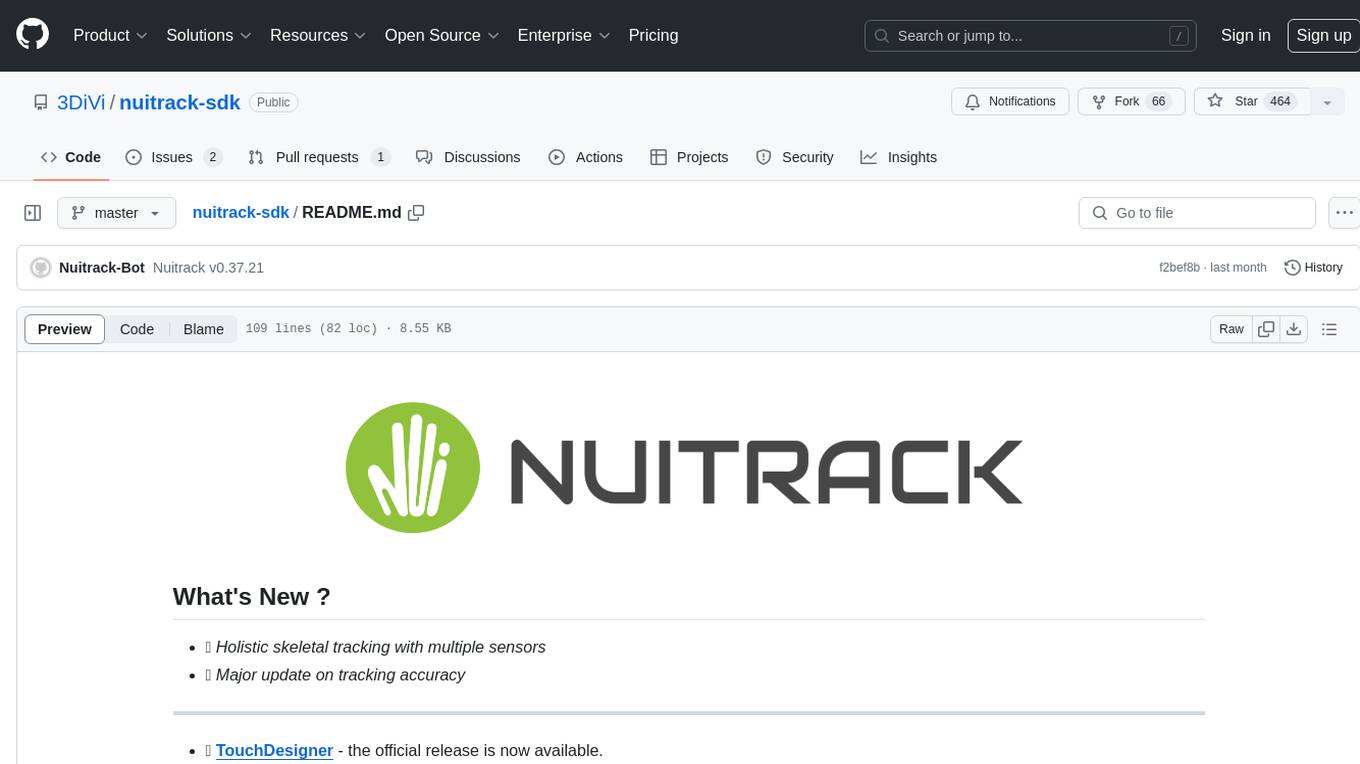
nuitrack-sdk
Nuitrack™ is an ultimate 3D body tracking solution developed by 3DiVi Inc. It enables body motion analytics applications for virtually any widespread depth sensors and hardware platforms, supporting a wide range of applications from real-time gesture recognition on embedded platforms to large-scale multisensor analytical systems. Nuitrack provides highly-sophisticated 3D skeletal tracking, basic facial analysis, hand tracking, and gesture recognition APIs for UI control. It offers two skeletal tracking engines: classical for embedded hardware and AI for complex poses, providing a human-centric spatial understanding tool for natural and intelligent user engagement.
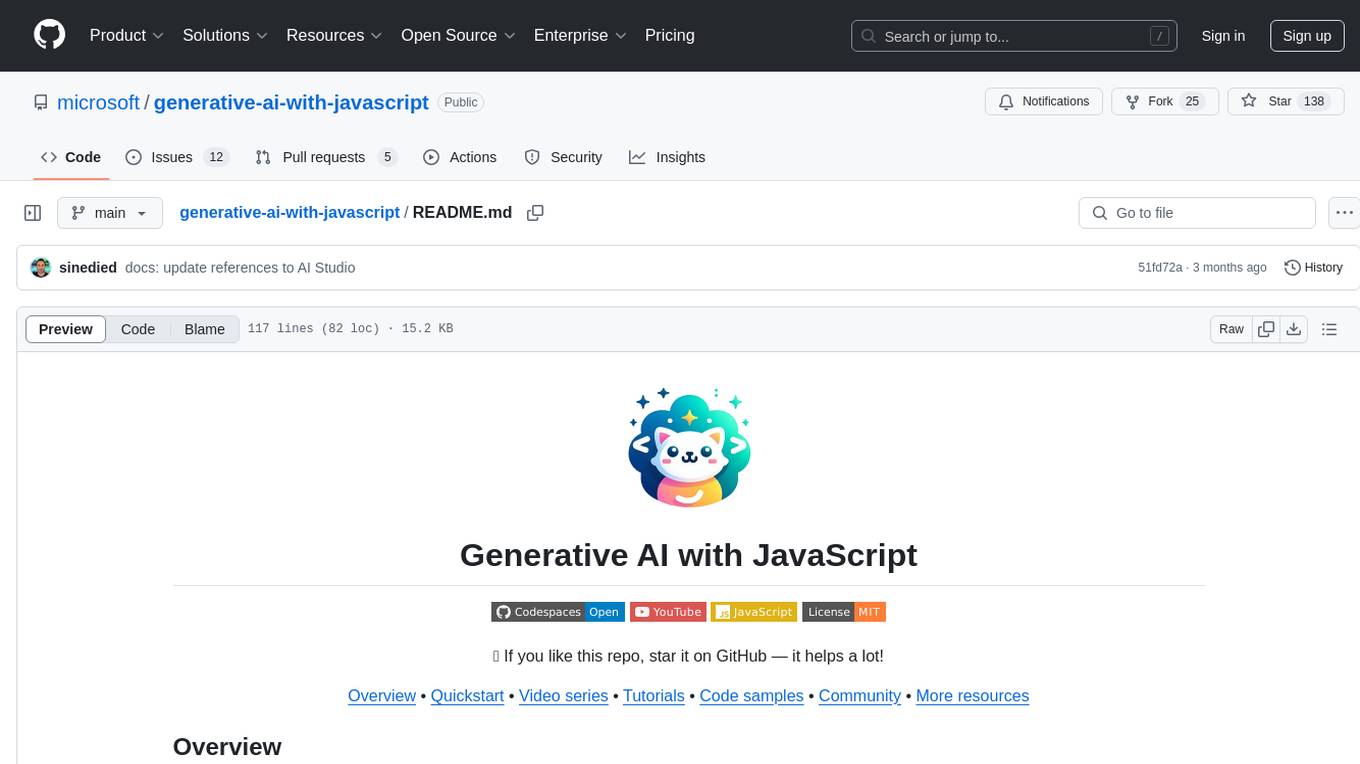
generative-ai-with-javascript
The 'Generative AI with JavaScript' repository is a comprehensive resource hub for JavaScript developers interested in delving into the world of Generative AI. It provides code samples, tutorials, and resources from a video series, offering best practices and tips to enhance AI skills. The repository covers the basics of generative AI, guides on building AI applications using JavaScript, from local development to deployment on Azure, and scaling AI models. It is a living repository with continuous updates, making it a valuable resource for both beginners and experienced developers looking to explore AI with JavaScript.
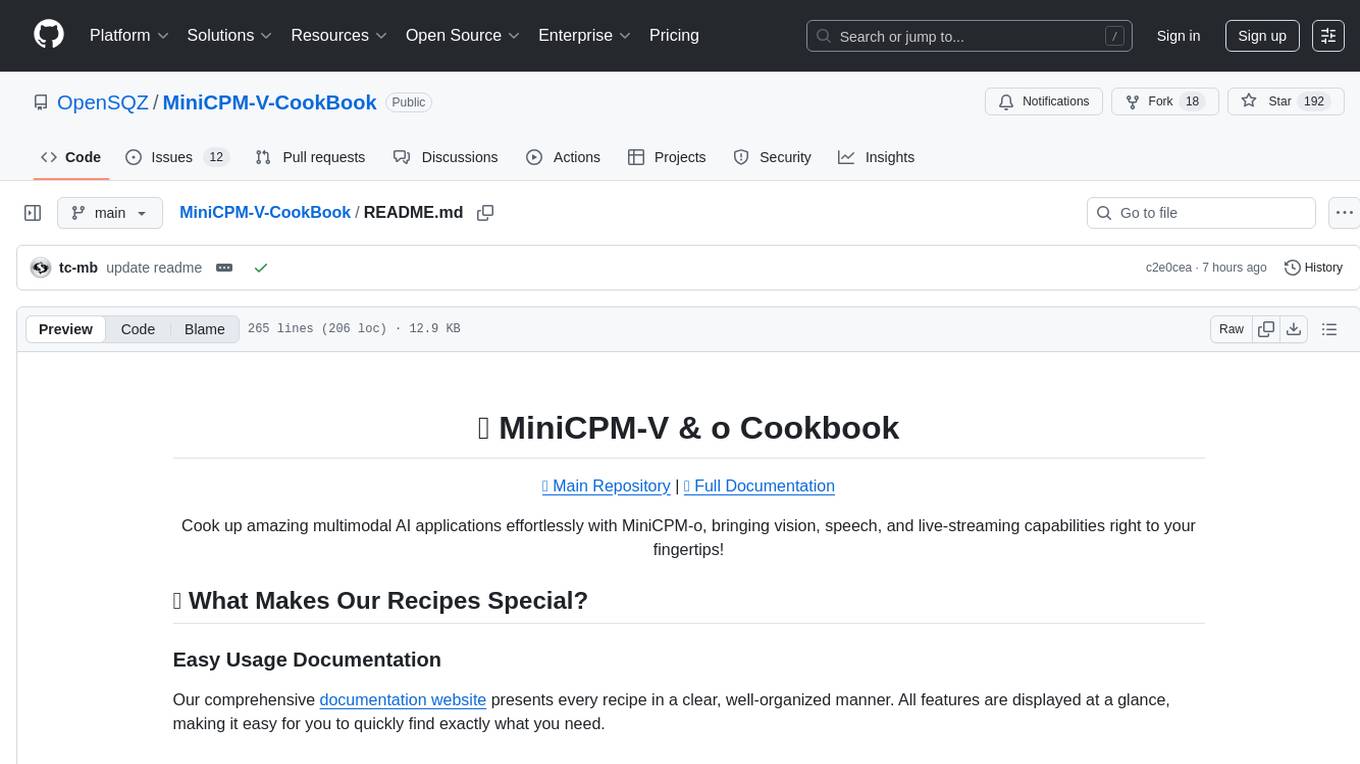
MiniCPM-V-CookBook
MiniCPM-V & o Cookbook is a comprehensive repository for building multimodal AI applications effortlessly. It provides easy-to-use documentation, supports a wide range of users, and offers versatile deployment scenarios. The repository includes live demonstrations, inference recipes for vision and audio capabilities, fine-tuning recipes, serving recipes, quantization recipes, and a framework support matrix. Users can customize models, deploy them efficiently, and compress models to improve efficiency. The repository also showcases awesome works using MiniCPM-V & o and encourages community contributions.
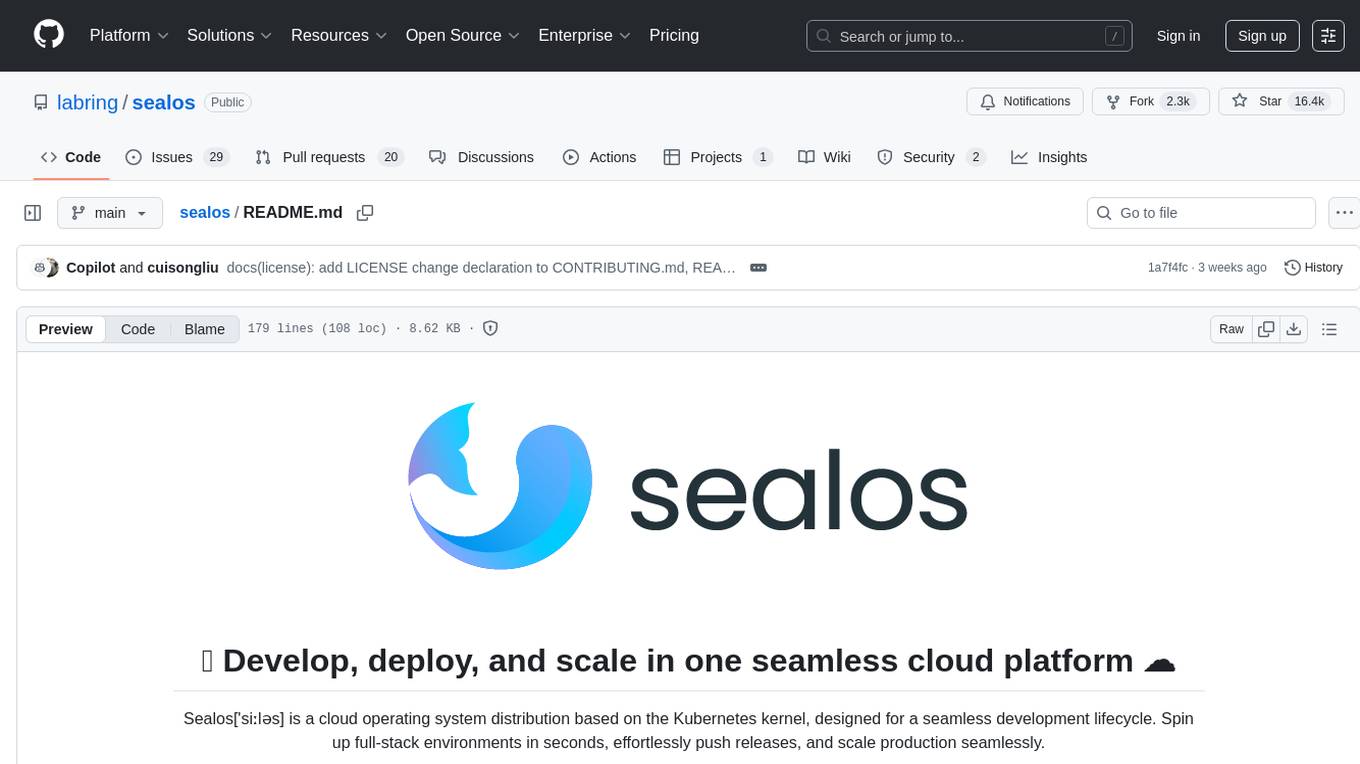
sealos
Sealos is a cloud operating system distribution based on the Kubernetes kernel, designed for a seamless development lifecycle. It allows users to spin up full-stack environments in seconds, effortlessly push releases, and scale production seamlessly. With core features like easy application management, quick database creation, and cloud universality, Sealos offers efficient and economical cloud management with high universality and ease of use. The platform also emphasizes agility and security through its multi-tenancy sharing model. Sealos is supported by a community offering full documentation, Discord support, and active development roadmap.
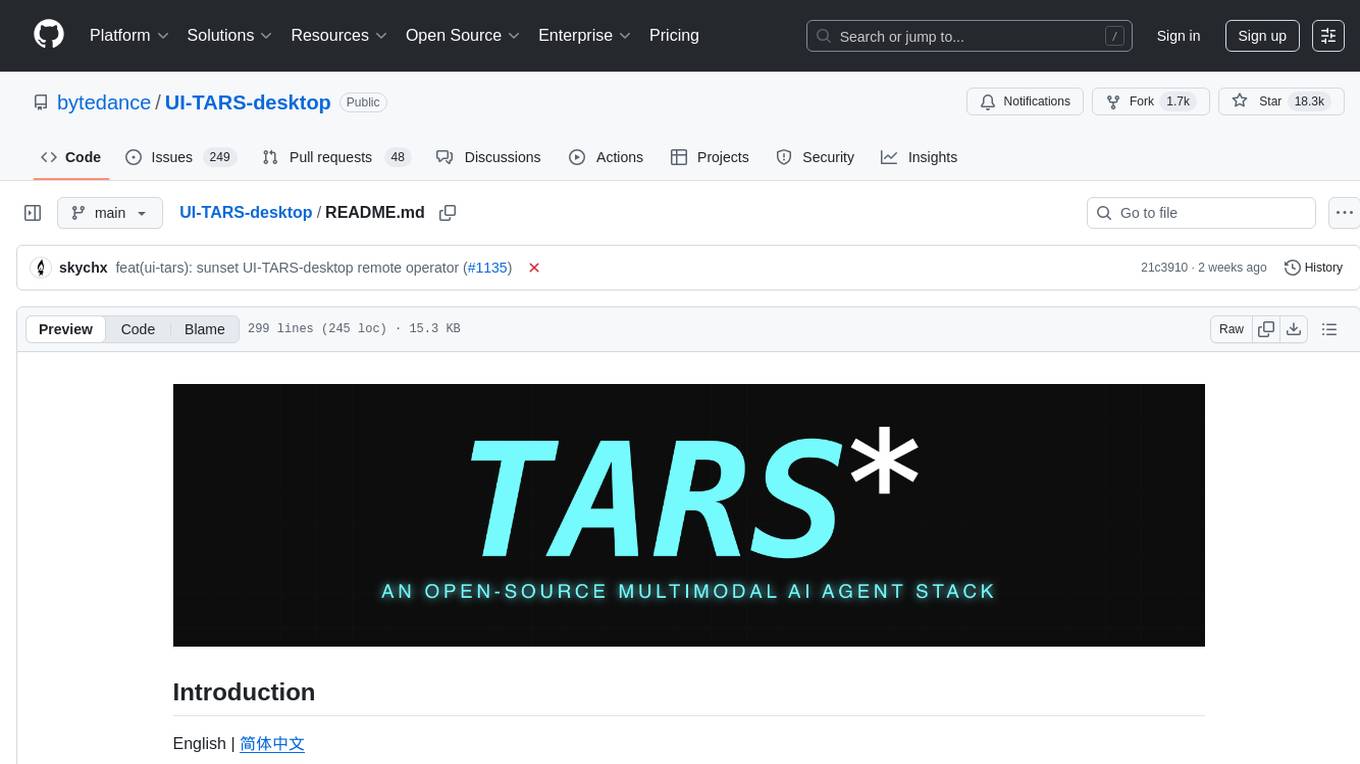
UI-TARS-desktop
UI-TARS-desktop is a desktop application that provides a native GUI Agent based on the UI-TARS model. It offers features such as natural language control powered by Vision-Language Model, screenshot and visual recognition support, precise mouse and keyboard control, cross-platform support (Windows/MacOS/Browser), real-time feedback and status display, and private and secure fully local processing. The application aims to enhance the user's computer experience, introduce new browser operation features, and support the advanced UI-TARS-1.5 model for improved performance and precise control.
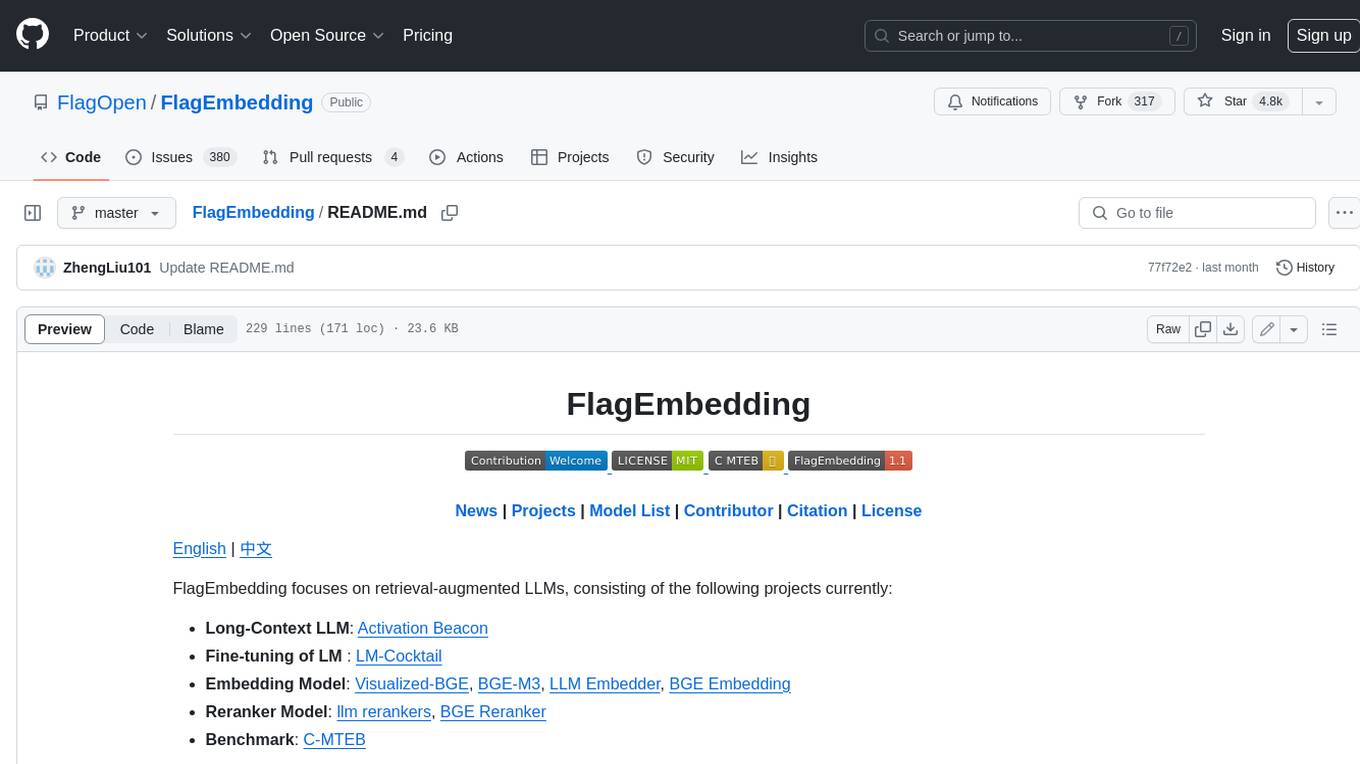
FlagEmbedding
FlagEmbedding focuses on retrieval-augmented LLMs, consisting of the following projects currently: * **Long-Context LLM** : Activation Beacon * **Fine-tuning of LM** : LM-Cocktail * **Embedding Model** : Visualized-BGE, BGE-M3, LLM Embedder, BGE Embedding * **Reranker Model** : llm rerankers, BGE Reranker * **Benchmark** : C-MTEB
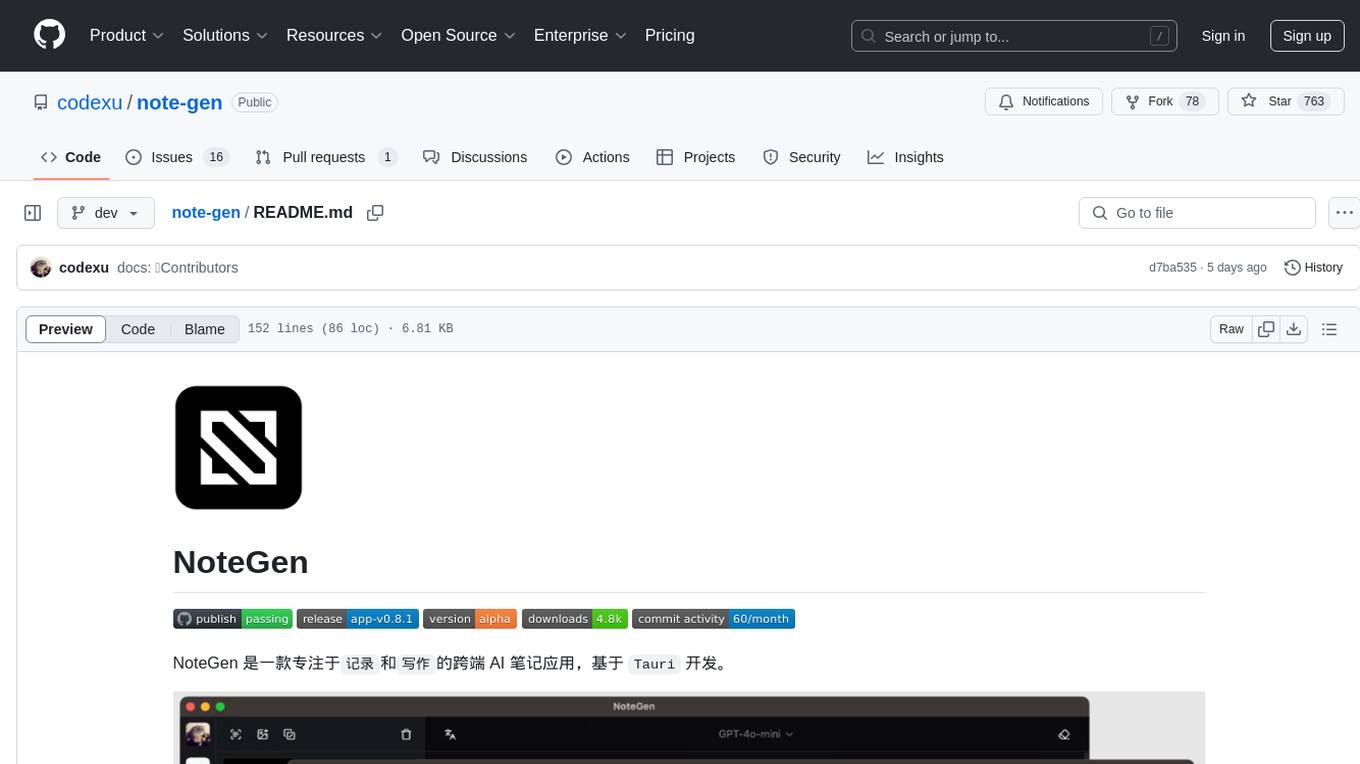
note-gen
Note-gen is a simple tool for generating notes automatically based on user input. It uses natural language processing techniques to analyze text and extract key information to create structured notes. The tool is designed to save time and effort for users who need to summarize large amounts of text or generate notes quickly. With note-gen, users can easily create organized and concise notes for study, research, or any other purpose.

mage-ai
Mage is an open-source data pipeline tool for transforming and integrating data. It offers an easy developer experience, engineering best practices built-in, and data as a first-class citizen. Mage makes it easy to build, preview, and launch data pipelines, and provides observability and scaling capabilities. It supports data integrations, streaming pipelines, and dbt integration.
For similar tasks
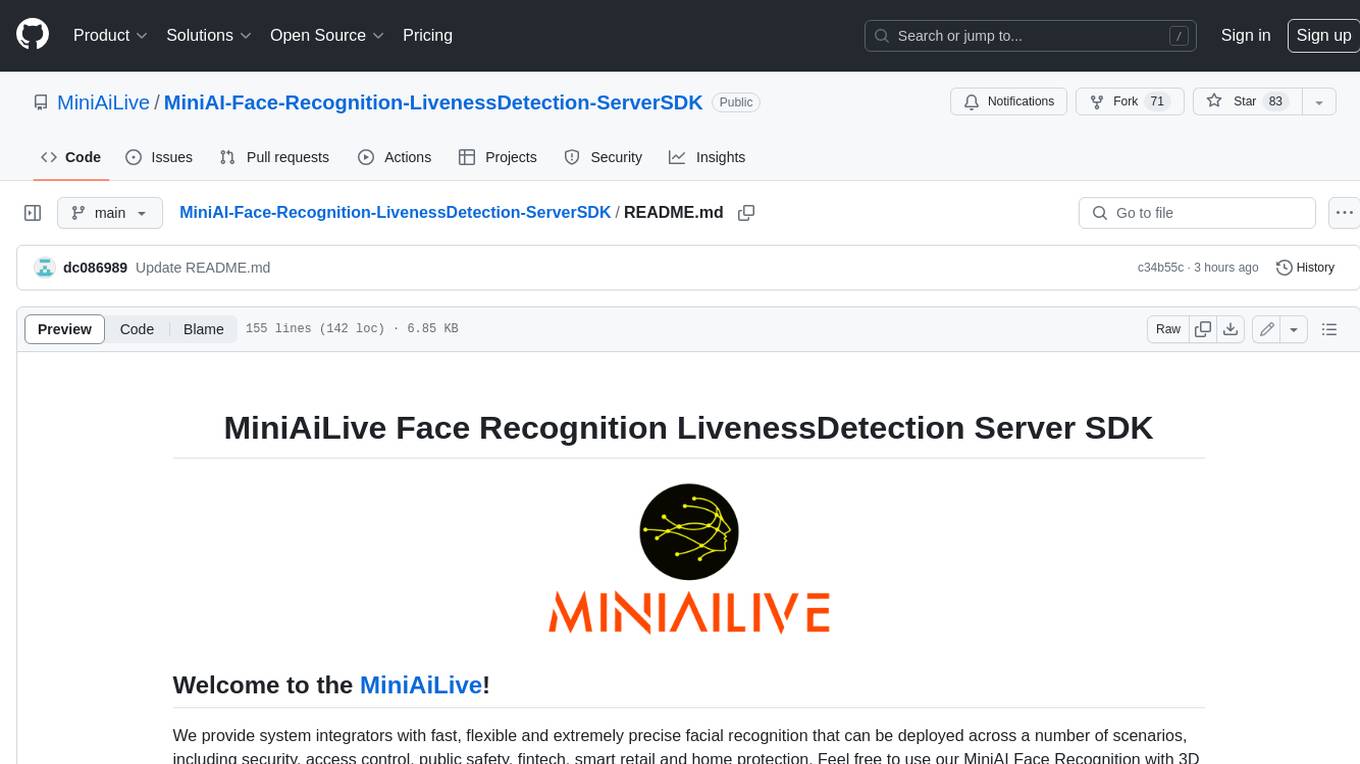
MiniAI-Face-Recognition-LivenessDetection-ServerSDK
The MiniAiLive Face Recognition LivenessDetection Server SDK provides system integrators with fast, flexible, and extremely precise facial recognition that can be deployed across various scenarios, including security, access control, public safety, fintech, smart retail, and home protection. The SDK is fully on-premise, meaning all processing happens on the hosting server, and no data leaves the server. The project structure includes bin, cpp, flask, model, python, test_image, and Dockerfile directories. To set up the project on Linux, download the repo, install system dependencies, and copy libraries into the system folder. For Windows, contact MiniAiLive via email. The C++ example involves replacing the license key in main.cpp, building the project, and running it. The Python example requires installing dependencies and running the project. The Python Flask example involves replacing the license key in app.py, installing dependencies, and running the project. The Docker Flask example includes building the docker image and running it. To request a license, contact MiniAiLive. Contributions to the project are welcome by following specific steps. An online demo is available at https://demo.miniai.live. Related products include MiniAI-Face-Recognition-LivenessDetection-AndroidSDK, MiniAI-Face-Recognition-LivenessDetection-iOS-SDK, MiniAI-Face-LivenessDetection-AndroidSDK, MiniAI-Face-LivenessDetection-iOS-SDK, MiniAI-Face-Matching-AndroidSDK, and MiniAI-Face-Matching-iOS-SDK. MiniAiLive is a leading AI solutions company specializing in computer vision and machine learning technologies.

MiniAI-Face-LivenessDetection-AndroidSDK
The MiniAiLive Face Liveness Detection Android SDK provides advanced computer vision techniques to enhance security and accuracy on Android platforms. It offers 3D Passive Face Liveness Detection capabilities, ensuring that users are physically present and not using spoofing methods to access applications or services. The SDK is fully on-premise, with all processing happening on the hosting server, ensuring data privacy and security.
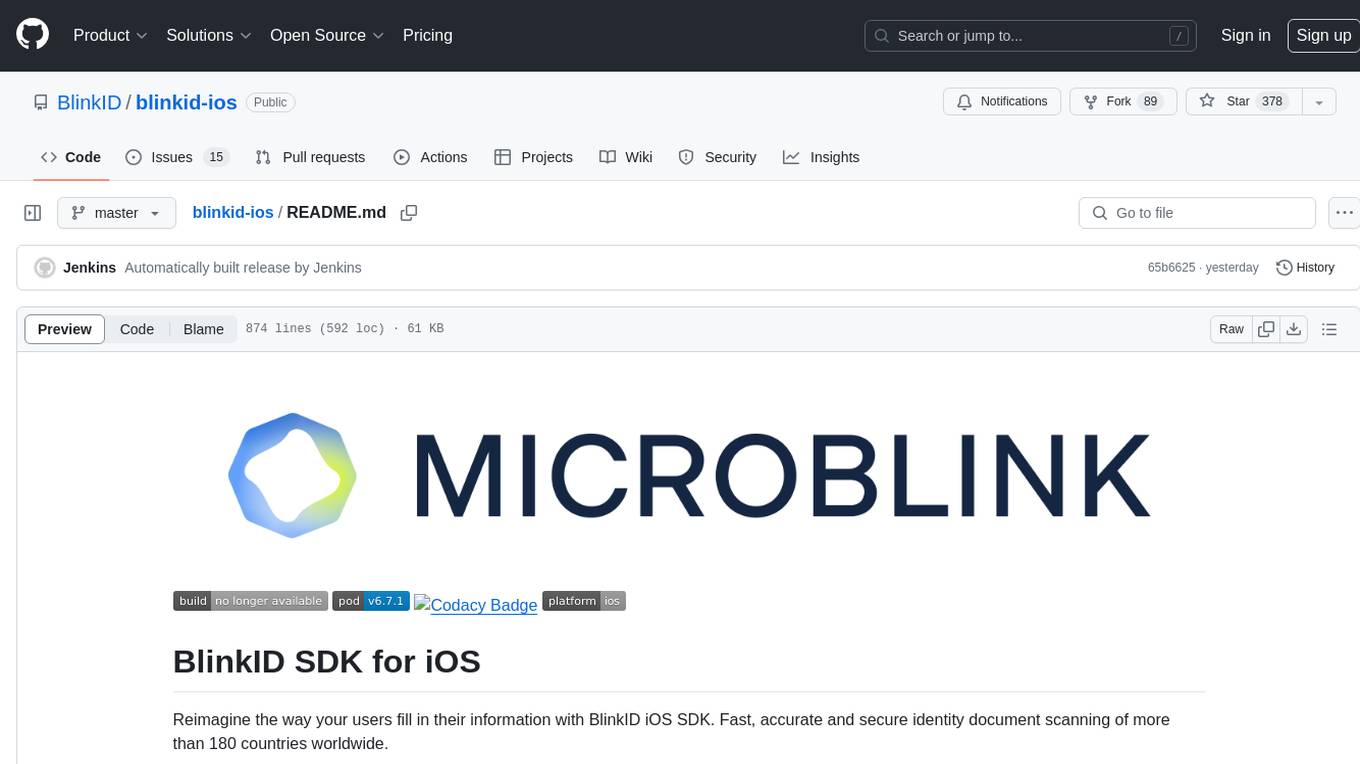
blinkid-ios
BlinkID iOS is a mobile SDK that enables developers to easily integrate ID scanning and data extraction capabilities into their iOS applications. The SDK supports scanning and processing various types of identity documents, such as passports, driver's licenses, and ID cards. It provides accurate and fast data extraction, including personal information and document details. With BlinkID iOS, developers can enhance their apps with secure and reliable ID verification functionality, improving user experience and streamlining identity verification processes.
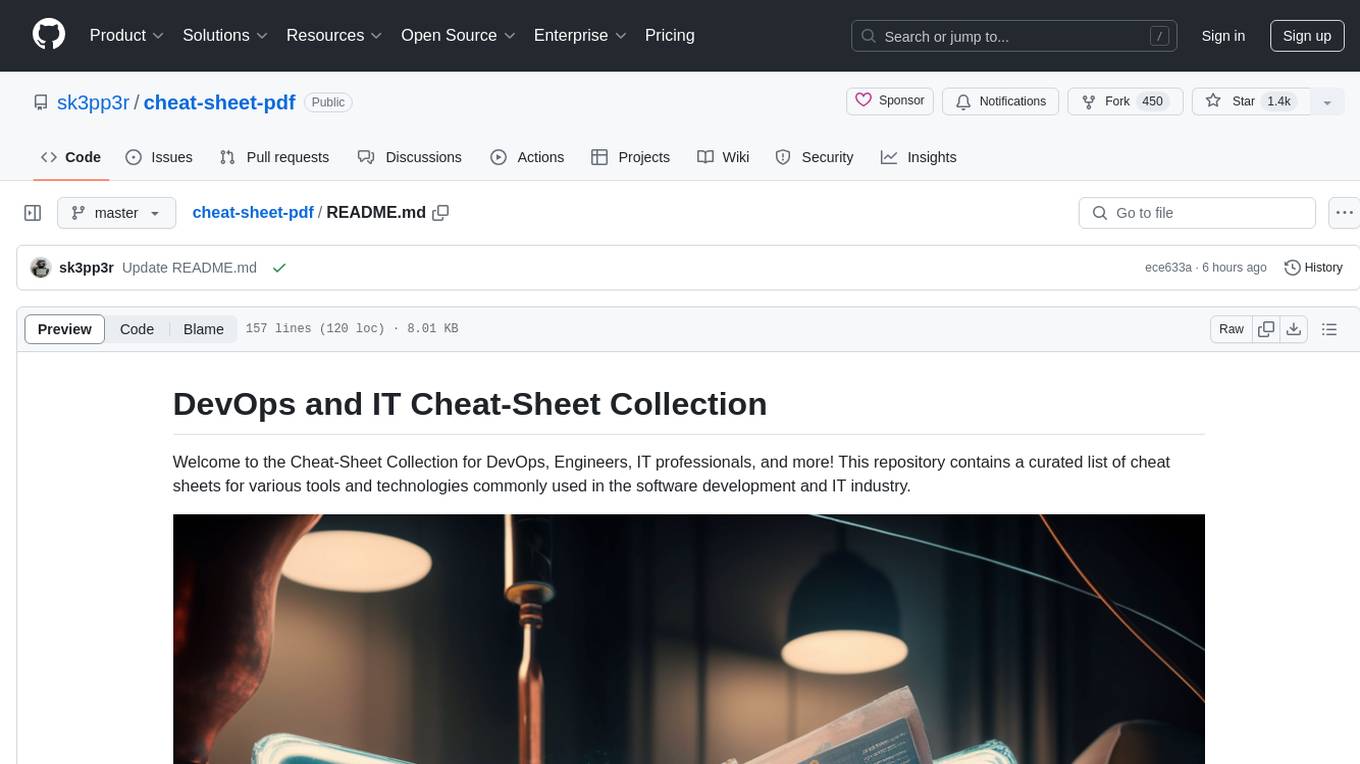
cheat-sheet-pdf
The Cheat-Sheet Collection for DevOps, Engineers, IT professionals, and more is a curated list of cheat sheets for various tools and technologies commonly used in the software development and IT industry. It includes cheat sheets for Nginx, Docker, Ansible, Python, Go (Golang), Git, Regular Expressions (Regex), PowerShell, VIM, Jenkins, CI/CD, Kubernetes, Linux, Redis, Slack, Puppet, Google Cloud Developer, AI, Neural Networks, Machine Learning, Deep Learning & Data Science, PostgreSQL, Ajax, AWS, Infrastructure as Code (IaC), System Design, and Cyber Security.
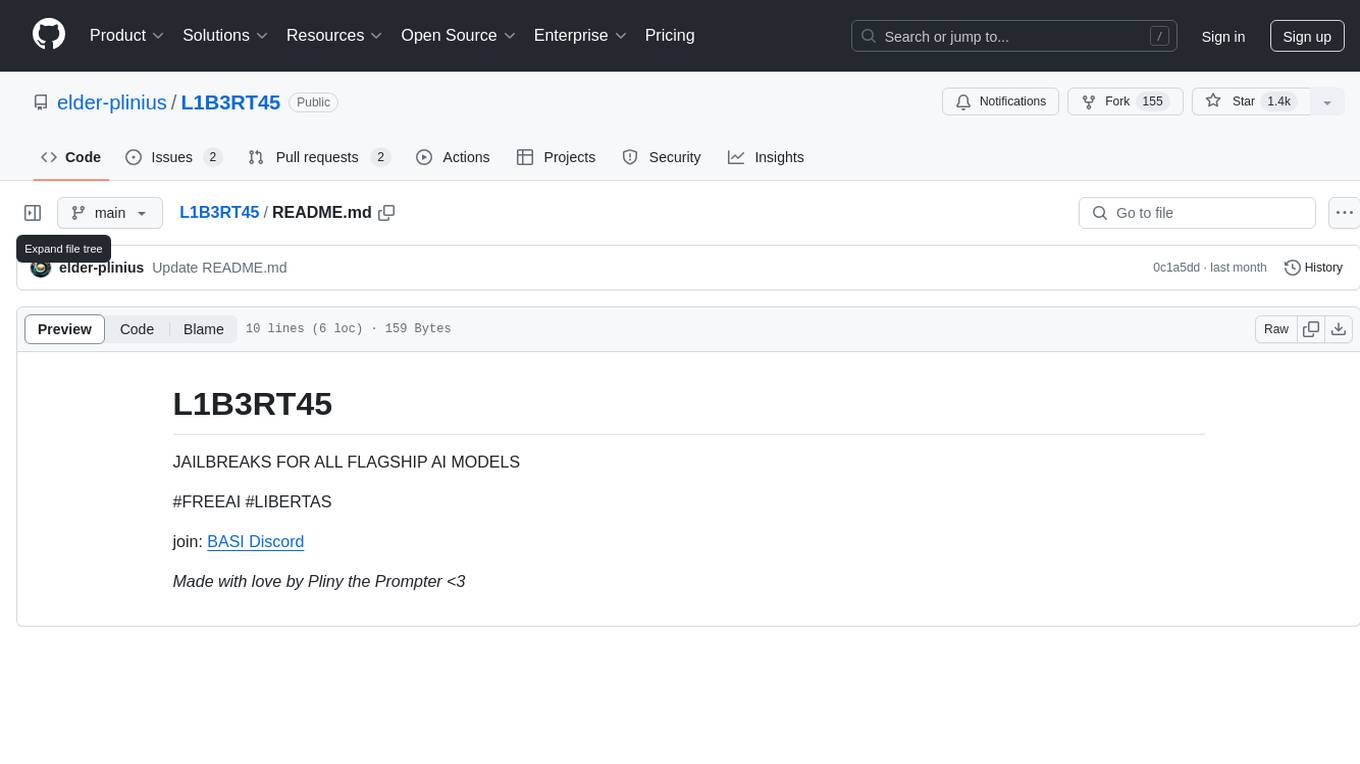
L1B3RT45
L1B3RT45 is a tool designed for jailbreaking all flagship AI models. It is part of the FREEAI project and is named LIBERTAS. Users can join the BASI Discord community for support. The tool was created with love by Pliny the Prompter.
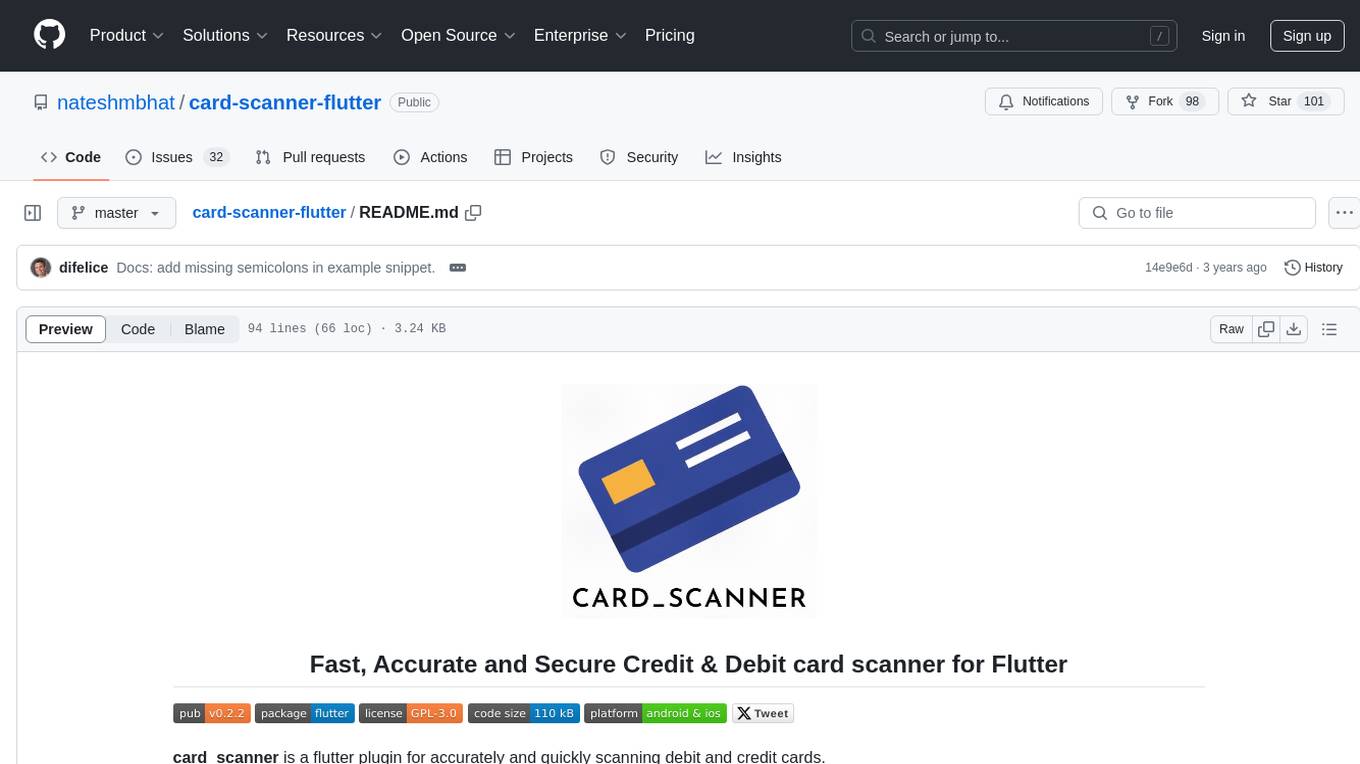
card-scanner-flutter
Card Scanner Flutter is a fast, accurate, and secure plugin for Flutter that allows users to scan debit and credit cards offline. It can scan card details such as the card number, expiry date, card holder name, and card issuer. Powered by Google's Machine Learning models, the plugin offers great performance and accuracy. Users can control parameters for speed and accuracy balance and benefit from an intuitive API. Suitable for various jobs such as mobile app developer, fintech product manager, software engineer, data scientist, and UI/UX designer. AI keywords include card scanner, flutter plugin, debit card, credit card, machine learning. Users can use this tool to scan cards, verify card details, extract card information, validate card numbers, and enhance security.
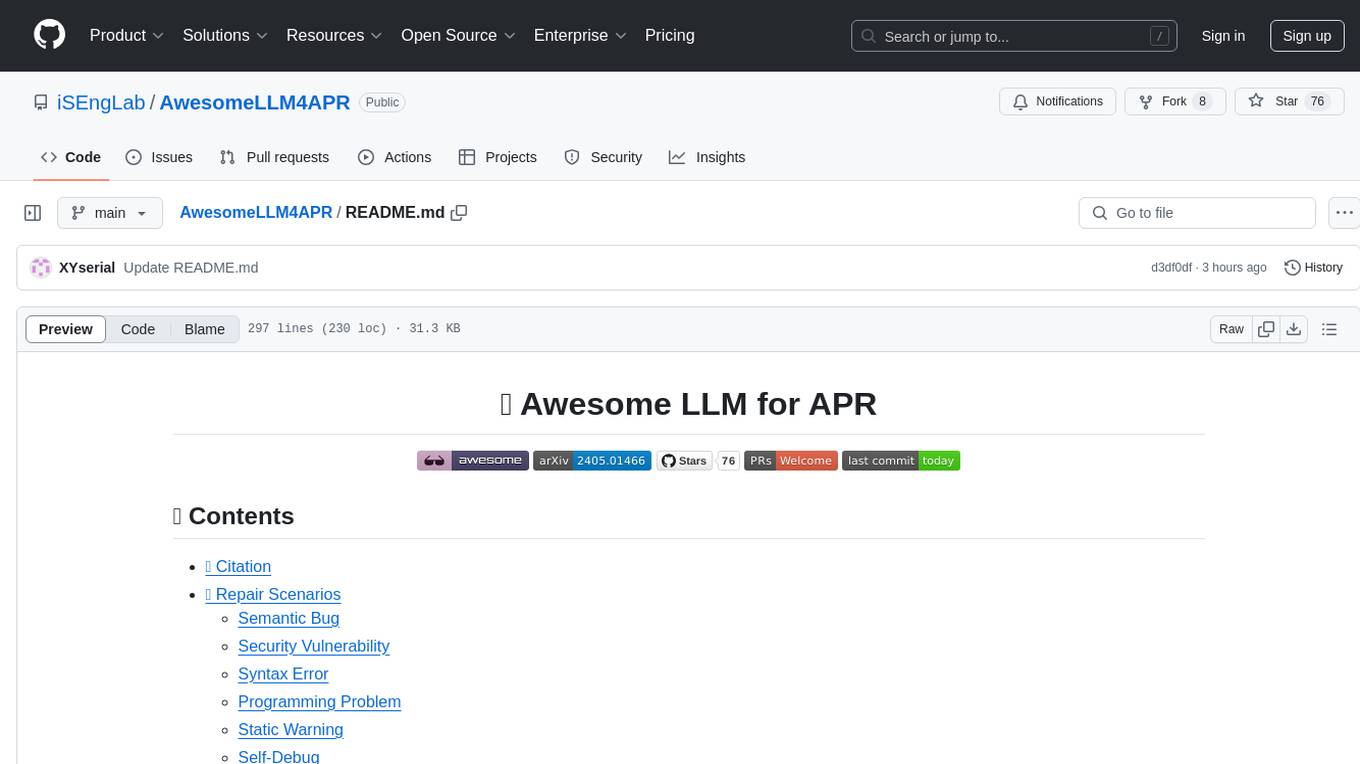
AwesomeLLM4APR
Awesome LLM for APR is a repository dedicated to exploring the capabilities of Large Language Models (LLMs) in Automated Program Repair (APR). It provides a comprehensive collection of research papers, tools, and resources related to using LLMs for various scenarios such as repairing semantic bugs, security vulnerabilities, syntax errors, programming problems, static warnings, self-debugging, type errors, web UI tests, smart contracts, hardware bugs, performance bugs, API misuses, crash bugs, test case repairs, formal proofs, GitHub issues, code reviews, motion planners, human studies, and patch correctness assessments. The repository serves as a valuable reference for researchers and practitioners interested in leveraging LLMs for automated program repair.
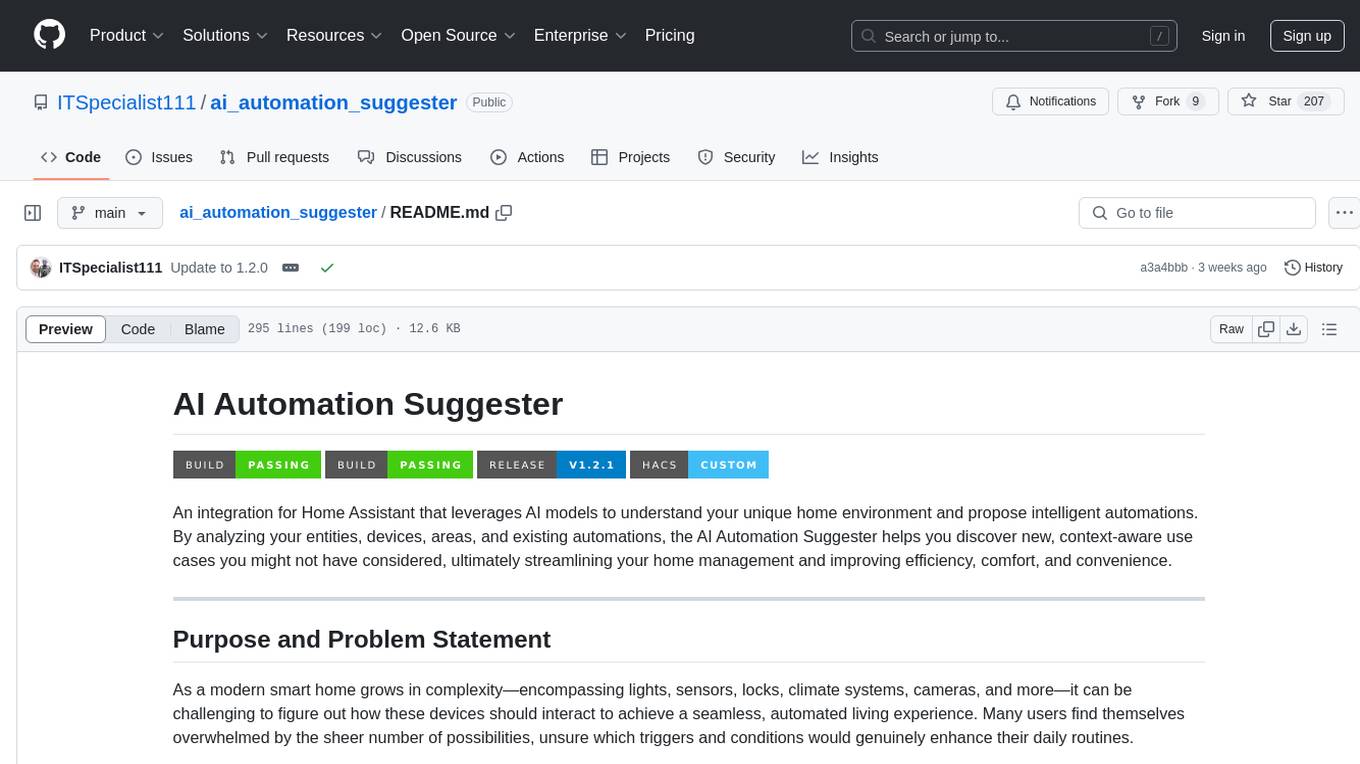
ai_automation_suggester
An integration for Home Assistant that leverages AI models to understand your unique home environment and propose intelligent automations. By analyzing your entities, devices, areas, and existing automations, the AI Automation Suggester helps you discover new, context-aware use cases you might not have considered, ultimately streamlining your home management and improving efficiency, comfort, and convenience. The tool acts as a personal automation consultant, providing actionable YAML-based automations that can save energy, improve security, enhance comfort, and reduce manual intervention. It turns the complexity of a large Home Assistant environment into actionable insights and tangible benefits.
For similar jobs

MiniAI-Face-LivenessDetection-AndroidSDK
The MiniAiLive Face Liveness Detection Android SDK provides advanced computer vision techniques to enhance security and accuracy on Android platforms. It offers 3D Passive Face Liveness Detection capabilities, ensuring that users are physically present and not using spoofing methods to access applications or services. The SDK is fully on-premise, with all processing happening on the hosting server, ensuring data privacy and security.

blinkid-ios
BlinkID iOS is a mobile SDK that enables developers to easily integrate ID scanning and data extraction capabilities into their iOS applications. The SDK supports scanning and processing various types of identity documents, such as passports, driver's licenses, and ID cards. It provides accurate and fast data extraction, including personal information and document details. With BlinkID iOS, developers can enhance their apps with secure and reliable ID verification functionality, improving user experience and streamlining identity verification processes.
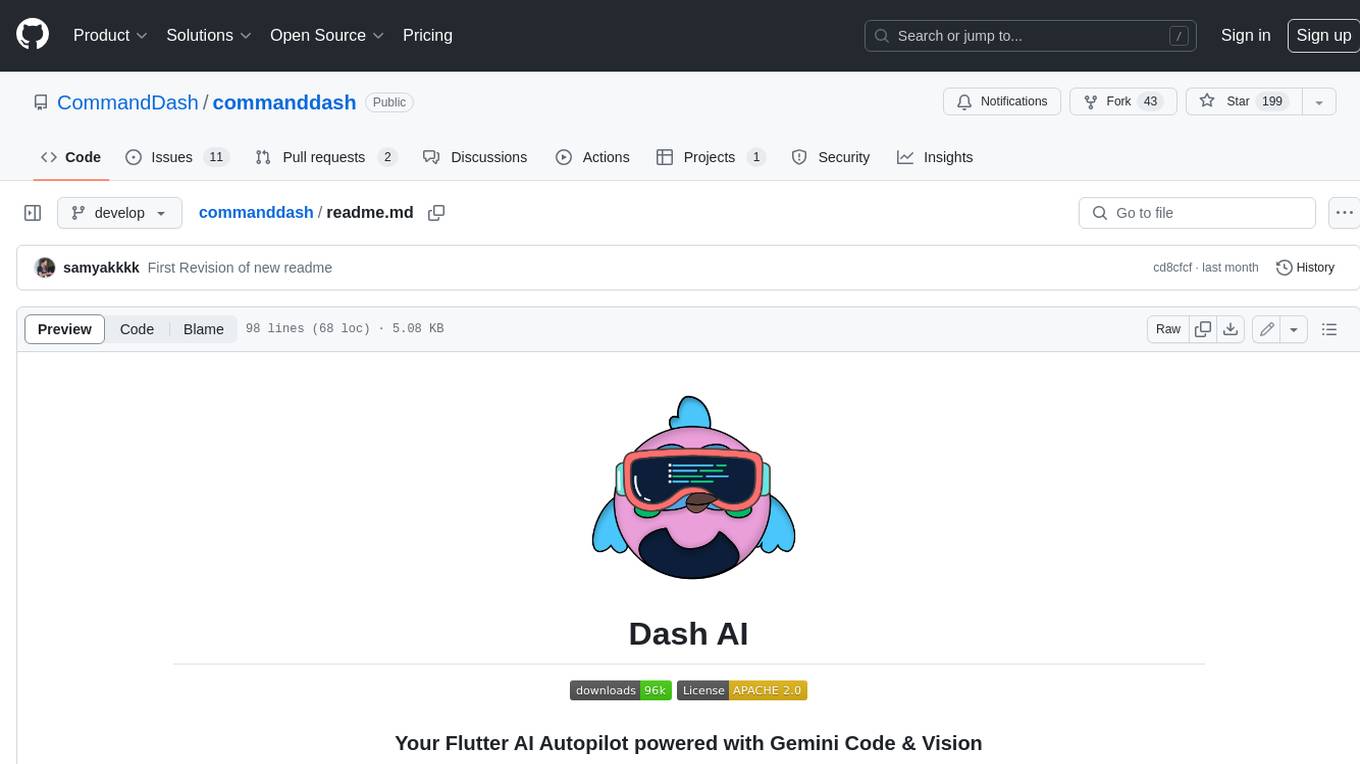
commanddash
Dash AI is an open-source coding assistant for Flutter developers. It is designed to not only write code but also run and debug it, allowing it to assist beyond code completion and automate routine tasks. Dash AI is powered by Gemini, integrated with the Dart Analyzer, and specifically tailored for Flutter engineers. The vision for Dash AI is to create a single-command assistant that can automate tedious development tasks, enabling developers to focus on creativity and innovation. It aims to assist with the entire process of engineering a feature for an app, from breaking down the task into steps to generating exploratory tests and iterating on the code until the feature is complete. To achieve this vision, Dash AI is working on providing LLMs with the same access and information that human developers have, including full contextual knowledge, the latest syntax and dependencies data, and the ability to write, run, and debug code. Dash AI welcomes contributions from the community, including feature requests, issue fixes, and participation in discussions. The project is committed to building a coding assistant that empowers all Flutter developers.
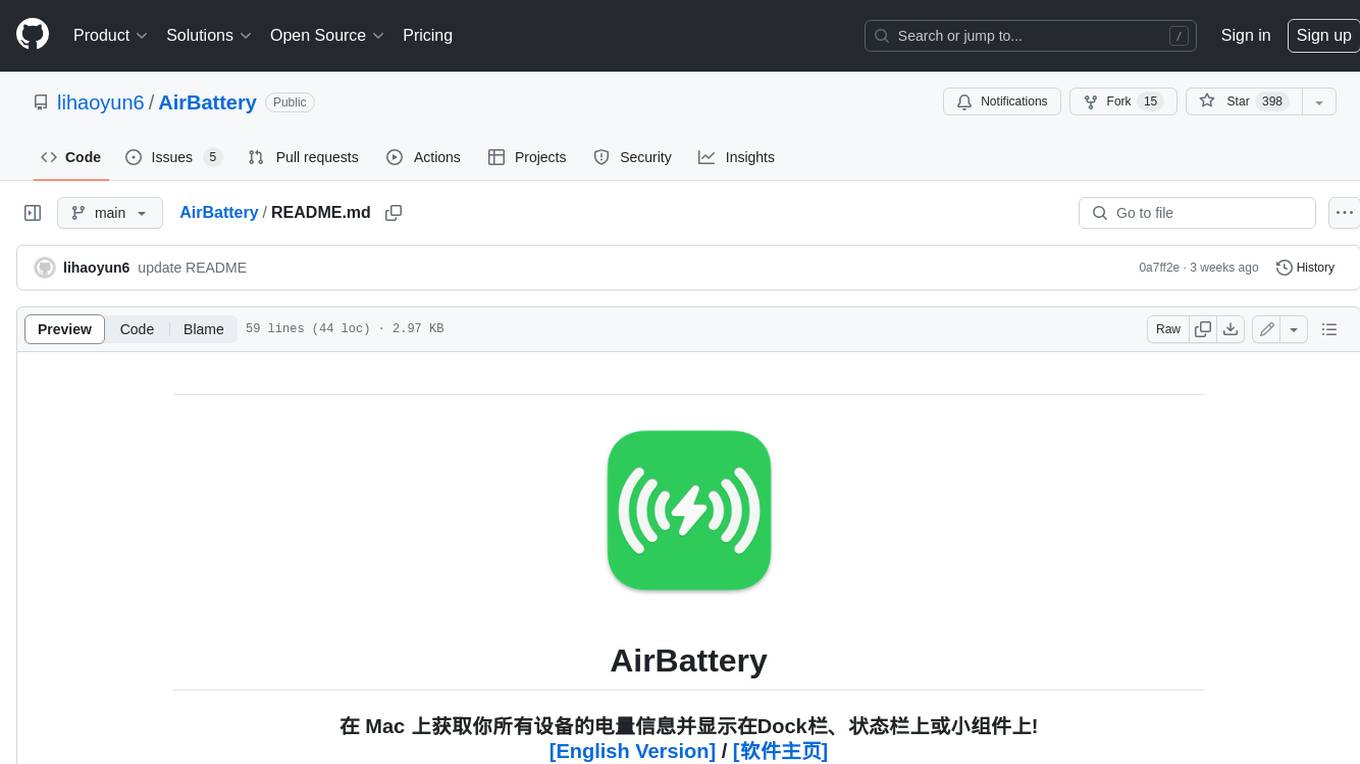
AirBattery
AirBattery is a tool for Mac that allows users to monitor the battery levels of all their connected devices, such as iPhone, iPad, and Apple Watch, and display this information in the Dock, menu bar, or widgets. It automatically detects devices that support wireless battery monitoring and provides a seamless user experience without the need for manual configuration. Users can customize the display settings, hide specific devices, and easily manage their battery information. The tool requires macOS 11.0 or higher and offers a convenient way to keep track of multiple device battery levels from a single interface.
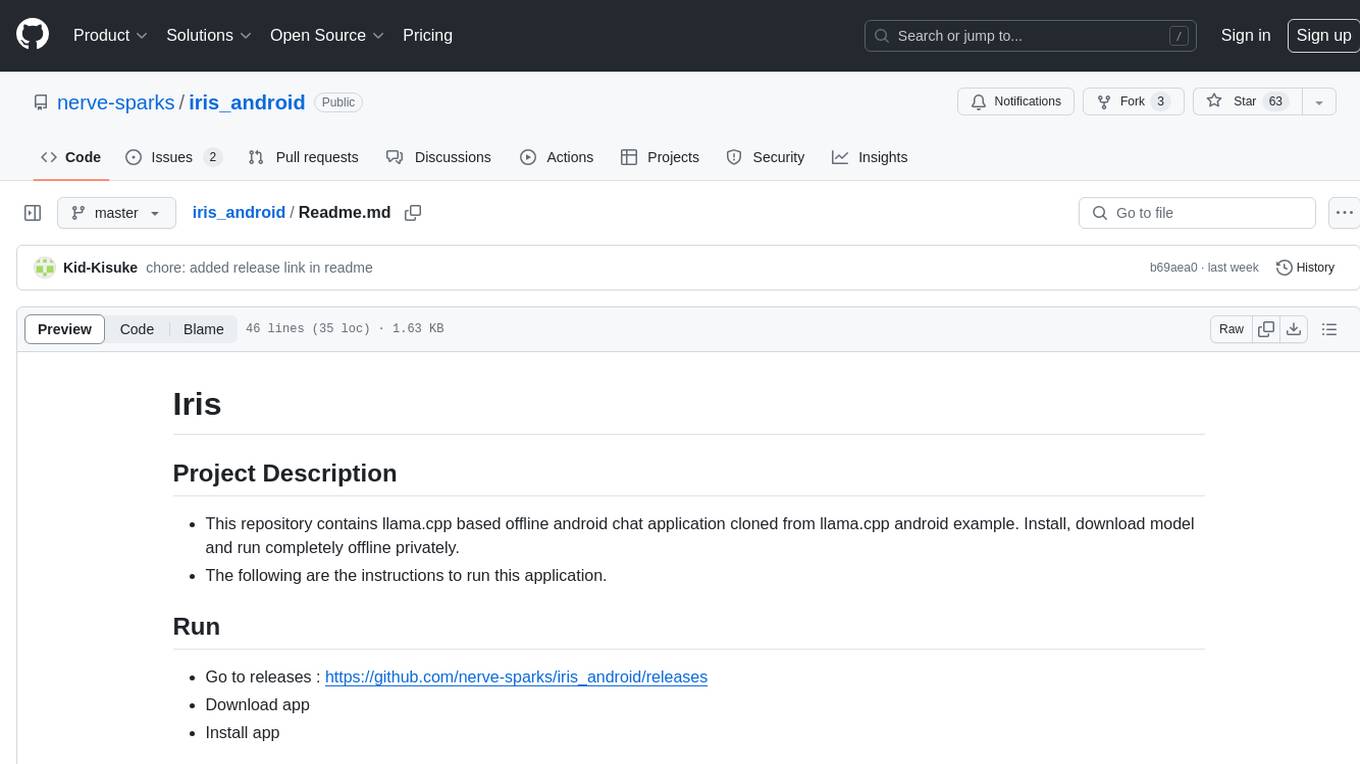
iris_android
This repository contains an offline Android chat application based on llama.cpp example. Users can install, download models, and run the app completely offline and privately. To use the app, users need to go to the releases page, download and install the app. Building the app requires downloading Android Studio, cloning the repository, and importing it into Android Studio. The app can be run offline by following specific steps such as enabling developer options, wireless debugging, and downloading the stable LM model. The project is maintained by Nerve Sparks and contributions are welcome through creating feature branches and pull requests.
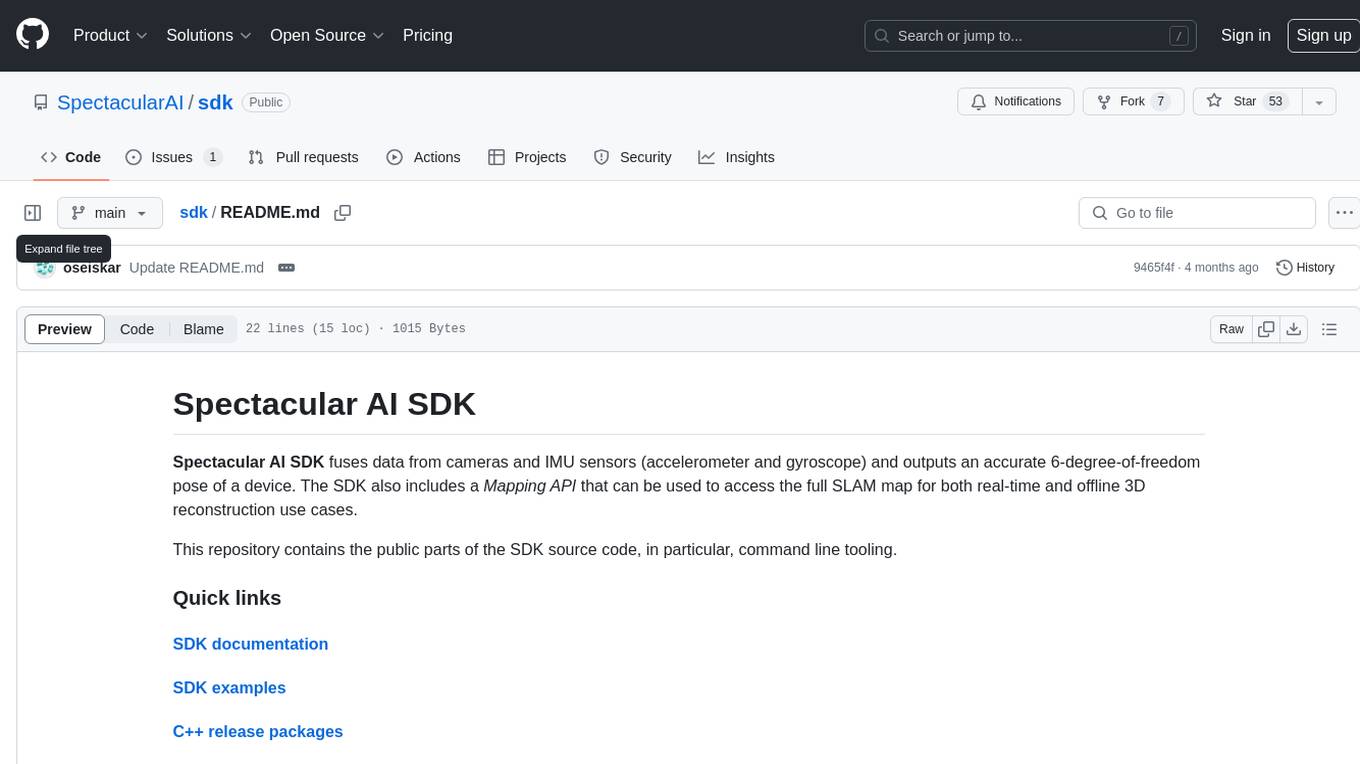
sdk
The SDK repository contains a software development kit that provides tools, libraries, and documentation for developers to build applications for a specific platform or framework. It includes code samples, APIs, and other resources to streamline the development process and enhance the functionality of the applications. Developers can use the SDK to access platform-specific features, integrate with external services, and optimize performance. The repository is regularly updated to ensure compatibility with the latest platform updates and industry standards, making it a valuable resource for developers looking to create high-quality applications efficiently.
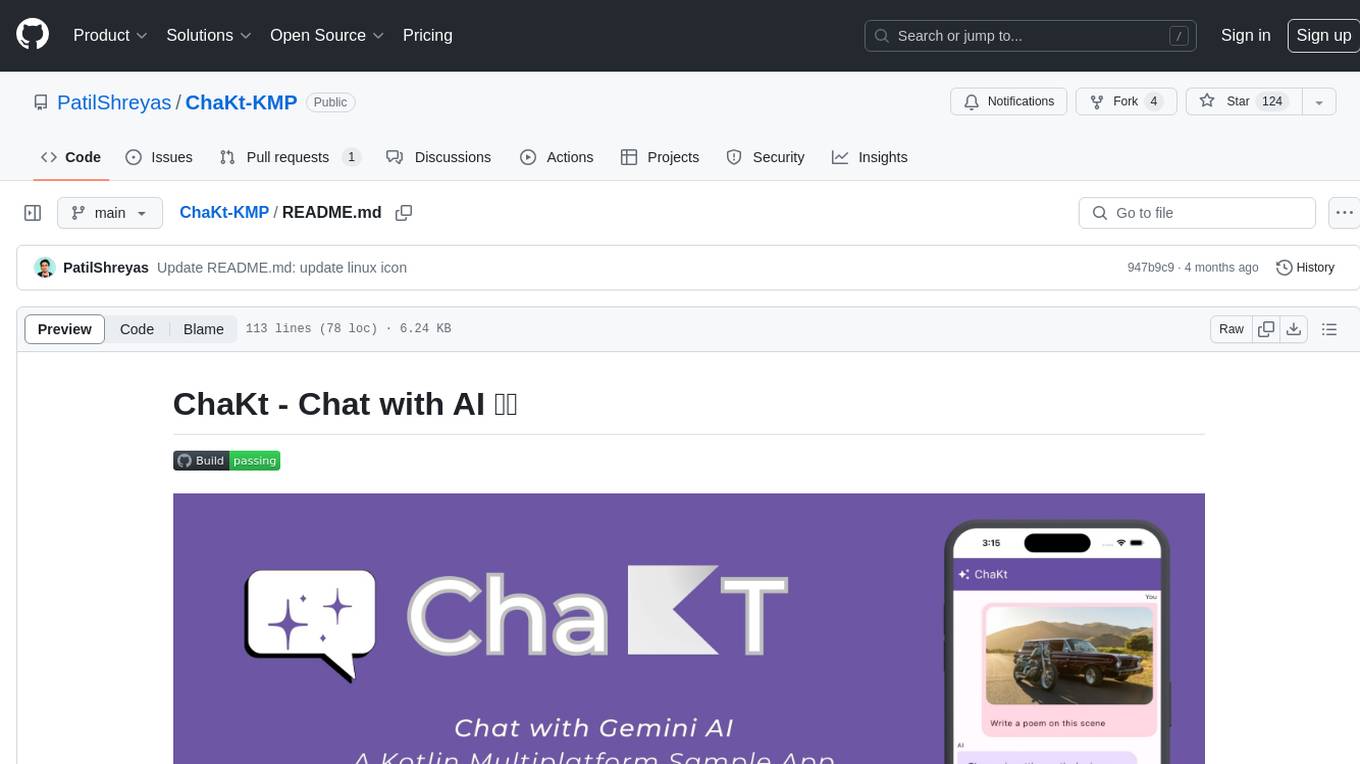
ChaKt-KMP
ChaKt is a multiplatform app built using Kotlin and Compose Multiplatform to demonstrate the use of Generative AI SDK for Kotlin Multiplatform to generate content using Google's Generative AI models. It features a simple chat based user interface and experience to interact with AI. The app supports mobile, desktop, and web platforms, and is built with Kotlin Multiplatform, Kotlin Coroutines, Compose Multiplatform, Generative AI SDK, Calf - File picker, and BuildKonfig. Users can contribute to the project by following the guidelines in CONTRIBUTING.md. The app is licensed under the MIT License.
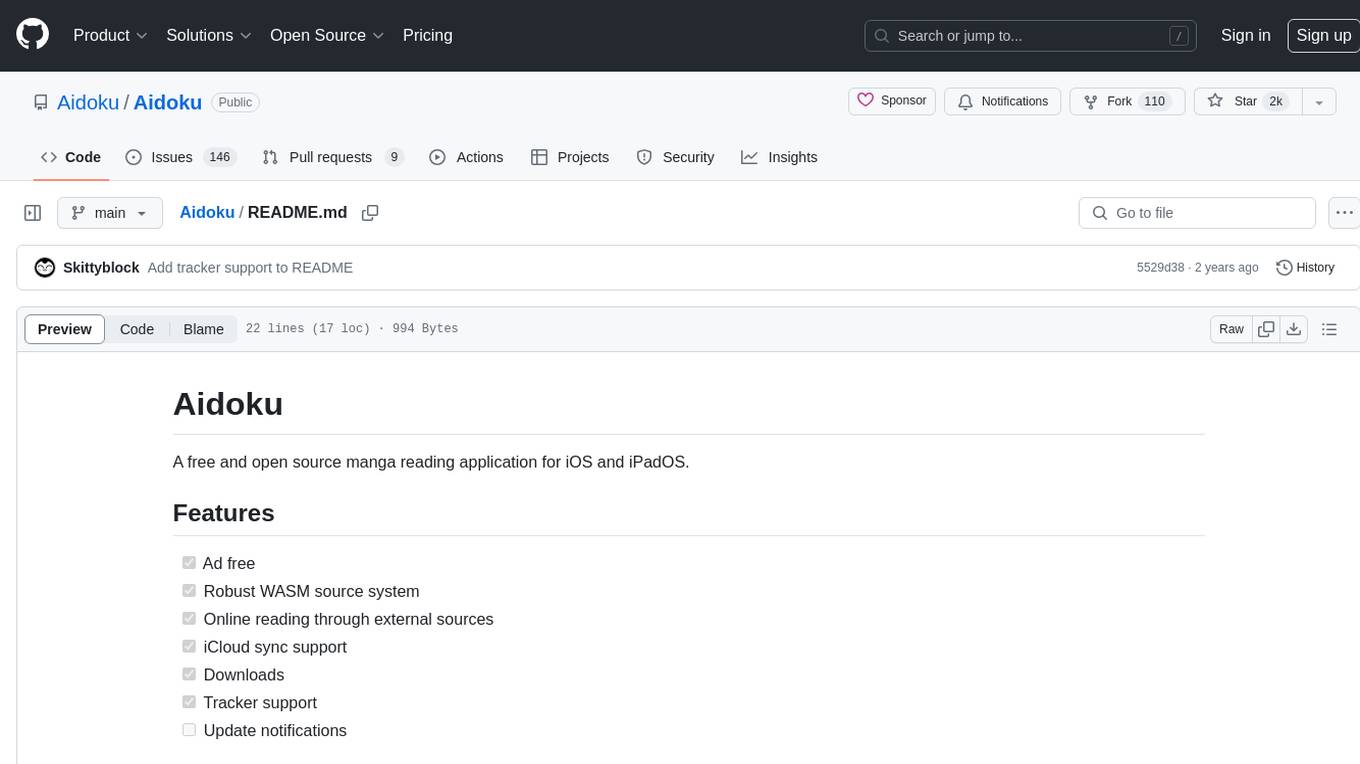
Aidoku
Aidoku is a free and open source manga reading application for iOS and iPadOS. It offers features like ad-free experience, robust WASM source system, online reading through external sources, iCloud sync support, downloads, and tracker support. Users can access the latest ipa from the releases page and join TestFlight via the Aidoku Discord for detailed installation instructions. The project is open to contributions, with planned features and fixes. Translation efforts are welcomed through Weblate for crowd-sourced translations.
